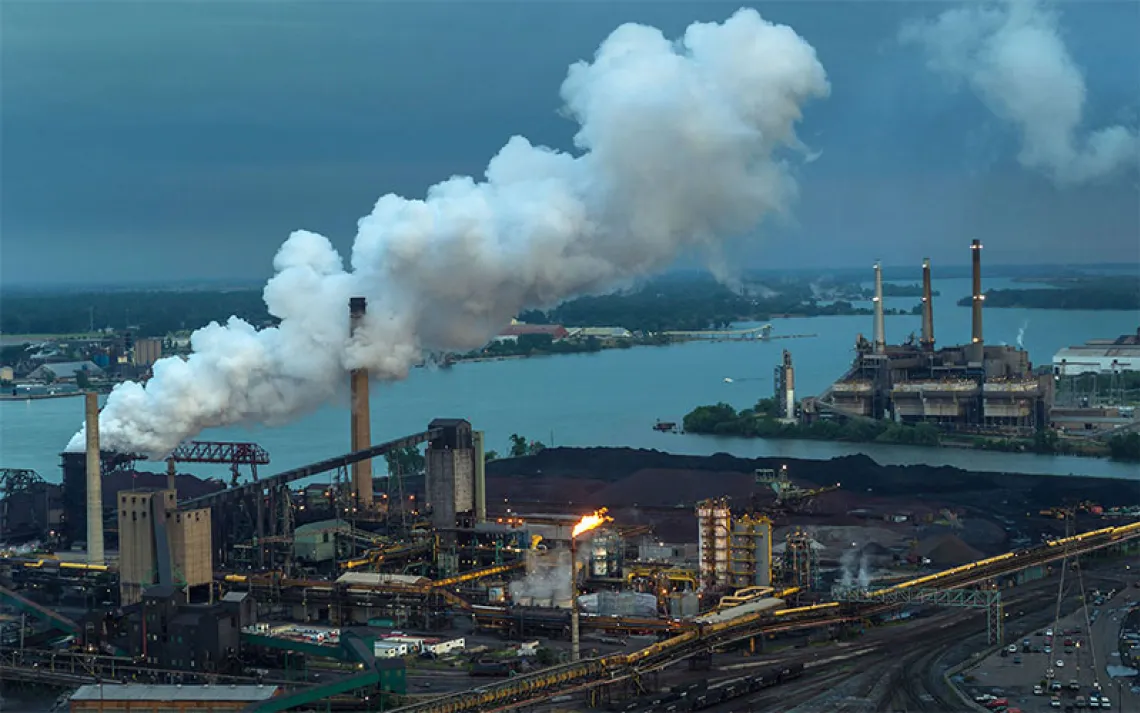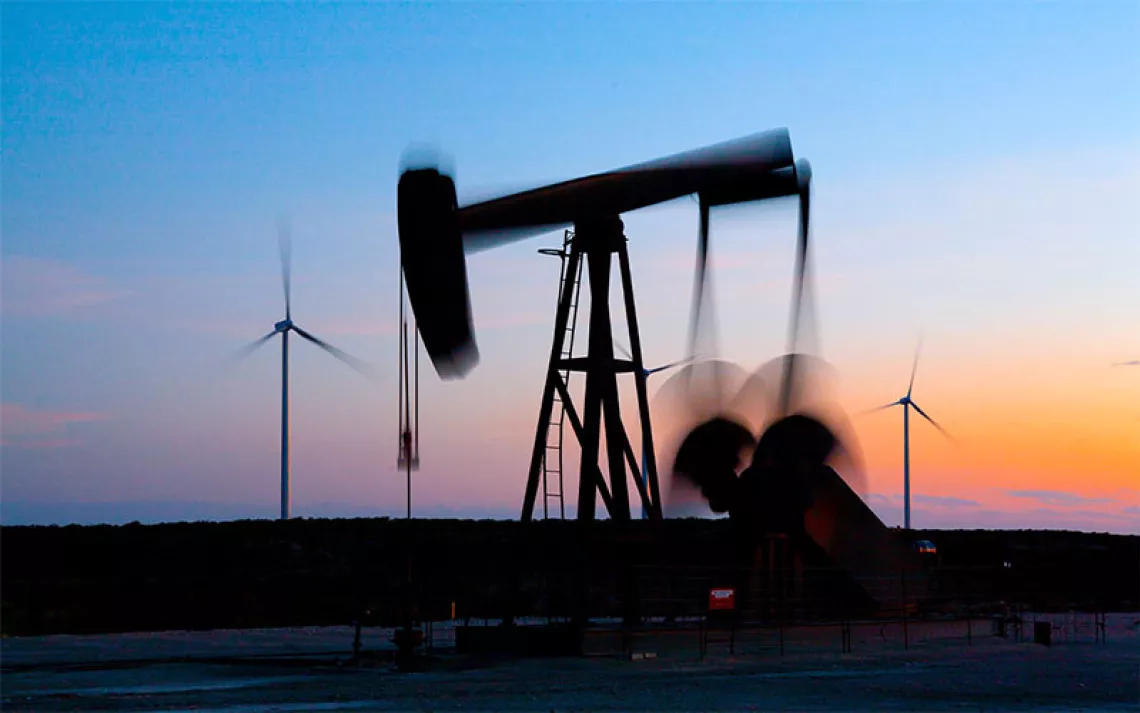California’s MAGA-Inflected Recall Carries Big Stakes for Climate Policy
A new governor could upend gains made to respond to the climate crisis

Governor Gavin Newsom speaks on stage at a "Vote No" rally in Los Angeles on September 4, 2021. | Photo by Conor Duffy/Sipa USA via AP Images
This September, as climate-fueled wildfires once again rage across the state, Californians will have the chance to recall Governor Gavin Newsom. If Newsom is voted out, his replacement will have the ability to reshape climate and environmental politics in the state. And according to environmental advocates, that’s cause for serious concern.
“The people who are running to replace Newsom should terrify everyone,” said Mike Young, the political and organizing director at the California League of Conservation Voters. The candidates include reality TV show star Caitlyn Jenner, who has bashed the Paris Agreement; businessman John Cox, who believes we should fight the climate crisis by exporting more fracked gas; and the current frontrunner, right-wing talk radio host Larry Elder. Formerly a climate denier, Elder now says that he accepts the reality of climate change, but he’s still “not sure” if it plays a role in fueling California’s wildfires. He’s also determined to “end the war on oil and gas.”
“There are deep connections between the industry forces that seek to kill environmental bills in the state legislature and the backers of this recall,” noted Mabel Tsang, the civic engagement program manager at the California Environmental Justice Alliance (CEJA), who spoke on behalf of the organization’s electoral arm, CEJA Action. The oil and gas industry is one of the top backers of the anti-Newsom campaign. A single company, Boyett Petroleum, contributed nearly $200,000 to the recall effort, and its founder, Stan Boyett, sent challenger Kevin Faulconer, the former mayor of San Diego, another $32,400.
Boyett didn’t respond to requests for comment, but Young says, “I don't think it takes a genius to figure out why oil companies are investing in this race.” Just this year, Newsom signed an executive order to phase out oil and gas drilling in the state by 2040, and his administration denied a spate of fracking permits.

Sign up to receive Sierra News & Views
Get articles like this one sent directly to your inbox weekly.
With this action you affirm you want to receive Sierra Club communications and may vote on policy designated by the Sierra Club Board.
Both industry and environmental advocates are throwing down for the recall because governors have so many avenues through which to shape environmental policy. They don’t just sign or veto legislation, important as that is. They also appoint the leaders of many of the agencies, boards, and commissions that carry out the day-to-day implementation of California’s environmental laws.
Environmental-justice leaders are particularly concerned about what a shake-up at the California Geologic Energy Management Division (CALGEM) could mean for a long-awaited rule on how far oil and gas wells must be set back from sensitive sites like homes, schools, and hospitals. They’ve spent years lobbying CALGEM for setbacks of at least 2,500 feet, which they argue is the minimum necessary to protect the health of those living nearby. “That would not fly under a Republican governor,” said Juan Flores, a community organizer with the Center on Race, Poverty, and the Environment.
More broadly, environmental-justice organizers worry that CALGEM would abandon the burgeoning focus on public health it developed during the Newsom administration and go back to being what Mercedes Macias, a Sierra Club organizer in Kern County, described as “a rubber stamp for the oil and gas industry.” That’s especially worrisome for Kern County communities, many of whom are represented by leaders whose strong industry ties leave them reluctant to regulate it.
In spring, Macias recounted, Kern County residents spent 11 hours testifying about the health and environmental harms of oil and gas drilling during a board of supervisors meeting where supervisors were considering whether to allow a single environmental impact report to serve as a blanket approval for 40,500 new oil and gas wells. “It took them two minutes to decide they were going to approve it,” she said. “We cannot rely on people who are clearly not representing their constituents in the best way, so we have to rely on these state agencies to help us and to protect us.”
Even if Newsom’s replacement were to leave existing leaders at CALGEM and other state agencies in place, a new governor’s priorities would have a major influence on how these state agencies carry out their missions. A climate skeptic like Elder might focus less on addressing the root causes of California’s extreme drought and wildfires—burning fossil fuels—and more on business-friendly management of the problems.
Pro-recall Republicans have criticized the State Water Resources Control Board’s response to California droughts during Newsom’s tenure, especially for the board’s work to ensure that endangered species have enough water, even if it means instituting restrictions on human water use elsewhere. Republicans want to invest in big water storage projects that will divert more water to the agricultural industry, potentially at the expense of threatened species.
“If fish don't have enough water to swim through the ecosystem, that likely means the water quality will be bad, and that the communities that depend on that specific ecosystem will have bad water quality,” Brandon Dawson, director of the Sierra Club California, said. “There's also the question of will there be enough water to flow through that ecosystem for those communities at all?”
Elder and other recall candidates have also echoed the call made by business groups to focus on forest management to control California’s fires—even as they’ve voiced their support for increasing production of the fossil fuels that help turn California forests into dry tinder.
Aside from their power over state agencies, governors can also shape environmental policy through executive orders. Newsom has earned praise from some environmentalists for executive orders directing the state to protect 30 percent of its lands and waters by 2030, end fracking by 2024, create a pathway to net-zero emissions by 2035 and a phase-out of oil extraction by 2045, and sell only zero-emission new cars and trucks by 2035.
But because these decisions were made through executive order, a successive governor, should Newsom be recalled, could roll them back. Larry Elder, for example, told the Los Angeles Times editorial board that as governor, “I would want more fracking, not less.” That would increase California’s contributions to the climate crisis and have wide-ranging health impacts, says Flores. Fracking wastewater contains a mix of chemicals that includes carcinogens like benzene—and farmers use it to irrigate their crops. “Farmworkers are being exposed to these chemicals,” Flores said. “On the other end, you have consumers buying grapes, almonds, pomegranate, oranges, and pistachios who do not know what’s in the water that was used to irrigate these crops.”
If you live outside the Golden State, you might be tempted to turn your gaze away from the messy, MAGA-inflected recall unfolding on the West Coast. But replacing Newsom would likely have ripple effects far beyond California’s borders. A new governor might well have the chance to pick a successor to the 88-year-old Senator Dianne Feinstein, which could flip the Senate to Republican control. And Tsang sees the recall as “an extension of national right-wing extremist forces” who are seeking to take power at every level of government. “They are leaving no state untouched,” Tsang said, warning that a victory in the recall campaign could embolden right-wing groups across the country.
California remains a major oil- and gas-producing state and the world’s fifth-largest economy. Its top decision-maker could do a lot to address the climate crisis—or a lot to make it worse. “Right now, as you and I are talking, thousands of families throughout the whole state are displaced” because of climate-change-fueled fires, Flores noted. “That’s what’s at stake here.”
 The Magazine of The Sierra Club
The Magazine of The Sierra Club



